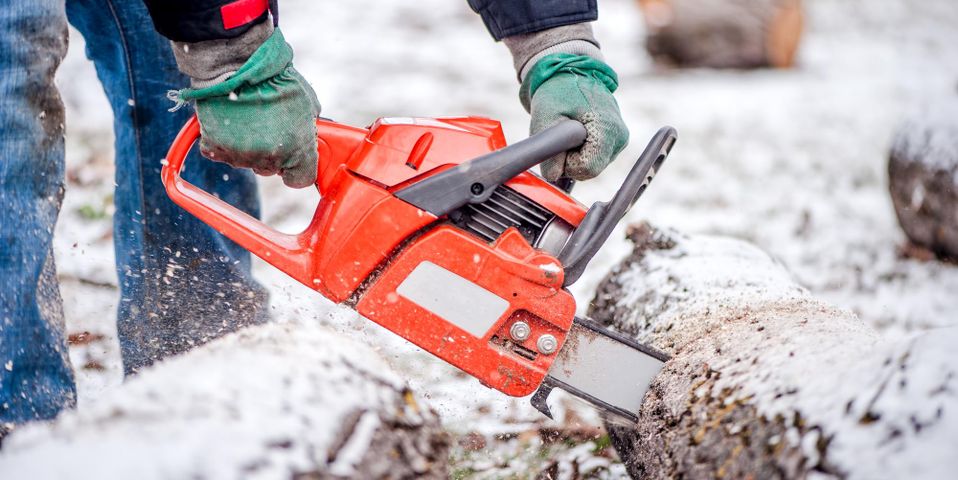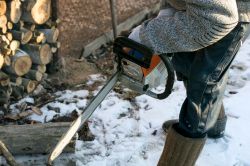
With cold weather approaching, many homeowners will use their chainsaws to cut firewood and address post-storm cleanup. However, owners must perform seasonal maintenance and change the way they handle these tools to promote safety and device longevity. Here are some tips on winter chainsaw use and care to ensure your tool stays in top shape.
Using Your Chainsaw During Winter
When the temperature is below 36 degrees Fahrenheit, wood is more likely to freeze. Always wear protective gear, including a thick jacket, goggles or safety glasses, and a helmet, to prevent harm from frozen wood splinters. Also, wear thick boots with excellent traction to avoid slipping while operating your chainsaw.
Before getting started, consider decreasing the chain angle by five degrees to make your chainsaw more efficient when cutting through frozen wood. This lower angle can make the chain last longer by preventing unnecessary wear.
Always knock snow and ice off the wood before beginning to cut, as this will limit falling debris that could distract you while you're operating the chainsaw. Also, use a long pole or shovel to poke snow from heavy branches to lower the risk of the tree breaking at unintended spots.
Caring for Your Chainsaw
 Many chainsaws feature a winter/summer shutter that prevents the carburetor from freezing in the cold. Flip this switch to turn on the pre-heater and keep your chainsaw working in the cold. Additionally, always dust snow off the device before refueling to keep water out of the tank, as watered-down gas can clog the engine.
Many chainsaws feature a winter/summer shutter that prevents the carburetor from freezing in the cold. Flip this switch to turn on the pre-heater and keep your chainsaw working in the cold. Additionally, always dust snow off the device before refueling to keep water out of the tank, as watered-down gas can clog the engine.
Make sure the anti-vibration system on the handle is also snow- and ice-free so it can protect your body from the chainsaw power. If this handle is slippery, you risk injury from losing your grip and dropping the saw.
If your chainsaw sits unused for several weeks, the ethanol in the fuel can break down and create clogs in the fuel system. To avoid this issue, pour a stabilizer into the gas tank to prevent oxygen from damaging the injectors and carburetor. If you only need the chainsaw for a brief project, consider draining the fuel afterward and leaving the tank empty for the remainder of the season to avoid oxidation issues.
If you need a chainsaw upgrade or replacement parts, contact L & R Power Equipment Inc. in Monroe, CT. This customer-focused company has been in business for over 58 years, selling top brands like Stihl® and Toro® to customers in Trumble, East End, Monroe, Shelton, and Fairfield. Call (203) 268-8400 or visit their website for information about their extensive inventory of power tools and parts.
About the Business
Have a question? Ask the experts!
Send your question

